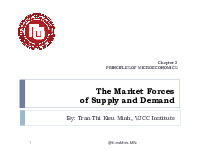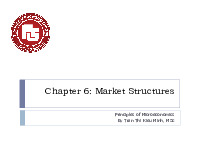

















Preview text:
lOMoAR cPSD| 36066900 lOMoAR cPSD| 360669
FOREIGN TRADE UNIVERSITY
MAJOR: INTERNATIONAL ECONOMICS
TOPIC: SUPPLY, DEMAND AND MARKET
EQUILIBRIUM FOR BEER AND
BREWING INDUSTRY IN VIETNAM Class: KTEE202.1
Instructor: Nguyễn Thị Tường Anh Researchers Student ID Lê Khắc Mạnh Tùng 2212450071 Lê Quang 2212450065 lOMoAR cPSD| 36066900 lOMoAR cPSD| 36066900 INTRODUCTION
Beer is the oldest alcoholic beverage in history, dating back to around 6000
BCE. Since then, the beer market has developed and gradually become a familiar
drink in our daily lives. It entered the Vietnamese market in the late 19th century
with the establishment of the Hanoi Brewery and Saigon Brewery.The industry of
producing and processing of beer and its products of Viet Nam in recent years has
developed dramatically. This movement has provided diverse products with
various modes and types for the national economic life and satisfied the domestic
demand. In addition, this sector has contributed significantly to the state budget,
creating jobs for the labor force, contributing to ensure livelihood and stabilizing social status.
Along with global marketing strategies, both foreign and national brands
have created significant competitive pressures in the battle for market share of
beer. Therefore, having a good perspective about beer market is essential. For that
reason, we decided to choose the topic: “Supply, Demand and Market Equilibrium
for beer and brewing industry in Viet Nam” to analyze the domestic market of
brewing products and help consumers gain a better understanding about it.
Hopefully our study can enrich your microeconomic knowledge, and
provoke your interest in beer production. Thank you and we would be appreciated
if you could leave any comments or ideas. lOMoAR cPSD| 36066900
INTRODUCTION TO VIET NAM BREWING INDUSTRY
Since the 1970s, thanks to the renovation and opening policies of the
Communist Party and the government of Socialist Republic of Viet Nam, the living
standards of the people have significantly improved, and there has been a rapid
increase in tourism and foreign investment in Vietnam, which has further
stimulated the development of various economic sectors. As a result, the
Vietnamese beer industry has experienced substantial growth within a short period.
This progress has been achieved through investments, the revitalization of existing
breweries, expansion of joint ventures with foreign countries, and the
establishment of new breweries by local, central, private, and joint-stock entities nationwide.
Currently, with nearly 4 billion liters of beer consumed in 2016, Vietnam
has become the third-largest beer market in the world, following Japan and China.
In 2017, Vietnam entered the top 10 largest beer markets in the world. Although
beer consumption in Vietnam continues to rise, it is not yet among the top 20
countries in terms of per capita beer consumption. The rapid increase in beer
consumption has propelled Vietnam to a higher position in the rankings of major
beer markets in the region and the world. Vietnam is currently the highest beer-
consuming country in Southeast Asia, ranking third in Asia after Japan and China,
and is in the top 25 worldwide. The total volume of beer consumed in Vietnam
over the past 8 years (2010-2017) has reached 25.23 billion liters, averaging 3.5
billion liters per year for the Vietnamese population.At the end of 2017, the
Vietnamese beer market experienced a major shake-up when 53.59% of the shares
of Saigon Beer Alcohol Beverage Corporation (Sabeco), with a value of nearly $5
billion, were acquired by Thaibev. lOMoAR cPSD| 36066900
Due to the immense attractiveness of the market, leading global beer brands
such as Heineken, Tiger, Carlsberg, Budweiser, Sapporo, and Sacabeo have all
entered Vietnam. As a result, the Vietnamese beer market has become more
competitive with the presence of over 30 major global beer brands. The increasing
number of international beer brands has intensified competition in the Vietnamese
beer market, especially in the premium beer segment. Faced with the strong
offensive of foreign beer brands, domestic beer producers naturally cannot remain
idle, and they have implemented new strategies to develop and compete fiercely in the Vietnamese beer market. lOMoAR cPSD| 36066900
CHAPTER 1: BASES ANALYZE SUPPLY, DEMAND AND MARKET EQUILIBRIUM
Supply and demand: Definition 1. Demand
• Definition: Demand is the quantity of products or services that buyers are
willing and able to buy at different prices in certain period of time given
everything else constant. There are many things that determine the quantity
demanded of any good, but when analyzing how market work, one
determinant plays thecentral role – the price of goods.
• Quantity demanded is the amount of goods that buyers are willing and able to purchase. • Law of demand
o Law of demand is the claim that the quantity demanded of a good falls
when the price of the good rises, other things equal • Definition: • Quantity demanded • Law of demand
o The relationship between price and quantity demanded of a good is negative. • Demand curve
• The demand curve illustrates how the
quantity demanded of a good changes
as its price varies. Because lower price increases the quantity
demanded, the demand curve slope downwards
• Shift in demand curve: There are
many variables that can shift the
demad curve. Here are the most important: o Income o Price of related goods (complementary goods and substitute goods) lOMoAR cPSD| 36066900 o Tastes of consumers o Expectation o Number of consumers 2. Supply
• Definition: Supply shows the amount of commodity that buyers are willing
and able to sell at different prices in certain period of time given
everything else constant. There are many determinants of quantity supplied,
but once again, price plays the primary role
• Quantity supplied: Quantity supplied is the amount of commodity that
suppliers are willing and able to sell • Law of supply:
o Law of supply is the claim that the quantity supplied of a good rises
when the price of the good rises, other things equal.
o The relationship between quantity supplied and price of a good is positive.
• Supply curve: The supply curve
illustrates how the quantity supplied of a
good changes as its price varies.
Because higher price increases the
quantity supplied, the demand curve slope upwards.
• Shift in supply curve: There are many
variables that can shift the supply curve. Here are the most important: o Input price o Technology o Government policy o Expectation o Number of sellers Shift in demand curve Income
Price of related good (Complementary goods and substituted goods) Tastes Expectation Number of buyers Income lOMoAR cPSD| 36066900
Price of related good (Complementary goods and substituted goods) Tastes Expectation Number of buyers Income
Price of related good (Complementary goods and substituted goods) Tastes Expectation Number of buyers lOMoAR cPSD| 36066900
CHAPTER 2: APPLICATION IN BEER AND BREWING INDUSTRY
1. Demand of beer in Vietnam market • Number of consumers:
- At the end of 2018, Vietnam experienced significant growth both in
terms of population and beer consumption. With a population reaching
96.9 million people, representing a notable 9.5% increase compared to
2010, the nation witnessed a remarkable surge in the consumption of
beer, reaching a staggering 62% growth rate. These statistical figures
shed light on the immense level of beer consumption within the
Vietnamese population.On average, in 2018, each Vietnamese
individual consumed approximately 43.3 billion liters of beer. This
consumption rate translates to an estimated total consumption of 4.2
billion liters of beer throughout the year. Such figures highlight the
significant role that beer plays in the daily lives and social activities of the Vietnamese people.
- Several factors contribute to this substantial beer consumption trend in
Vietnam. Firstly, the country's demographic structure, often referred to
as the "golden population," signifies a large proportion of the
population being of working age. With a growing middle class and an
increasing level of disposable income, the desire for leisure activities
and socialization has intensified. Beer consumption has become
intertwined with social gatherings, celebrations, and relaxation,
making it an integral part of the Vietnamese lifestyle.
- Additionally, the rising levels of education and awareness among the
Vietnamese population have led to an increased appreciation for
quality products. Foreign beer brands, such as Heineken, have
capitalized on this demand, positioning themselves as premium brands
that offer high-quality beer. The allure of these international beer
brands, with their distinct flavors, premium packaging, and
sophisticated branding, has contributed to their rapid growth in the Vietnamese market.
- Moreover, the stability and positive outlook of Vietnam's economy
have bolstered consumer confidence and spending power. As the
country continues to attract foreign investments and experience
economic growth, individuals are more willing to indulge in
recreational activities, including beer consumption • Consumer’s income:
- The development of Vietnam over the past 30 years is indeed highly
commendable, driven by the comprehensive economic and political lOMoAR cPSD| 36066900
reforms known as “Đổi mới” since 1986. These reforms have played a
pivotal role in propelling rapid economic growth, transforming
Vietnam from one of the poorest countries globally to a nation with a burgeoning average income.
- From 2002 to 2018, Vietnam witnessed a remarkable increase in GDP
per capita by 2.7 times, reaching over 2,700 USD in 2019. This
substantial growth has had a profound impact on the overall well-
being of the population, with over 45 million individuals lifted out of
poverty. The poverty rate, which was previously over 70%, has
dramatically decreased to less than 6%. These statistics highlight the
significant improvement in living standards and economic conditions
that the Vietnamese people have experienced.
- The rise in income levels among the Vietnamese population has
inevitably influenced their consumption patterns, including the
demand for beer. As people's incomes increase, they tend to allocate a
larger portion of their budget to discretionary goods and services, such
as beverages. This has resulted in an upsurge in the quantity demand
for beer, as individuals have more disposable income to spend on
leisure activities and socializing.
- However, it is important to note that the impact of income on beer
consumption is not uniform across all types of beer. As income levels
rise, there is typically a shift in preferences from lower-quality or "bia
hơi" (draft beer) to higher-quality packaged beer or "bia lon." This
change in consumer behavior can be attributed to an increased desire
for products that are associated with higher quality, branding, and perceived status.
• Price of related goods: o Substitute goods:
- The entrance of global beer brands like Tiger, Heineken, and
Budweiser into the Vietnamese market has significantly impacted the
dynamics of the beer industry. With their established reputations and
high-quality products, these brands have gained a strong foothold and
a loyal consumer base in Vietnam. However, their presence has also
led to an increase in the availability of substitute goods in the beer market.
- The availability of various beer brands and styles has created a diverse
range of choices for consumers. As a result, consumers now have the
flexibility to switch between different types of beer based on factors
such as price, taste, and brand preference. When the price of a lOMoAR cPSD| 36066900
particular beer brand or type increases, consumers may seek out more
affordable alternatives, which can include both local and international beer brands o Complementary goods:
- Complementary goods have a significant impact on the demand for
beer in Vietnam. These goods are products or services that enhance
the overall beer-drinking experience and are often consumed
alongside beer. The availability and quality of complementary goods
can influence consumer preferences and contribute to increased beer consumption.
- One aspect of complementary goods is the wide range of snacks and
appetizers that pair well with beer. When there is a variety of tasty and
complementary food options available, consumers are more likely to
indulge in beer consumption. The combination of beer with delicious
snacks creates a desire for people to enjoy the beverage alongside
these food items, ultimately driving up the demand for beer.
- The availability of proper beer glasses and accessories also
contributes to the demand for beer. Specialized glassware designed for
different beer styles enhances the visual appeal and drinking
experience, attracting beer enthusiasts.
- Furthermore, accessories like bottle openers, coasters, and beer
koozies add to the overall beer-drinking experience, making it more
enjoyable and enticing for consumers • Consumers’ taste:
- Consumer taste for beer in Vietnam has undergone significant changes
over the years. Historically, the Vietnamese beer market was
dominated by lighter, lower-alcohol content beers, often referred to as
"bia hơi" or draft beer. These beers were popular due to their
affordability and accessibility, and they catered to the local preference
for lighter, less bitter flavors.
- However, with the rapid economic development and rising income
levels, consumer tastes for beer in Vietnam have become more diverse
and sophisticated. There is now a growing demand for a wide range of
beer styles, including lagers, ales, stouts, and craft beers. Vietnamese
consumers are increasingly interested in exploring different flavors,
experimenting with new beer varieties, and embracing the global craft beer movement. lOMoAR cPSD| 36066900
- As a result, the Vietnamese beer market has witnessed the entry of
numerous international beer brands, offering a broader selection of
options to consumers. Brands like Heineken, Tiger, Carlsberg,
Budweiser, and craft breweries from around the world have gained
popularity and established a strong presence in Vietnam. These brands
cater to the evolving tastes of Vietnamese consumers who seek
premium, high-quality beers with distinct flavors and unique brewing techniques.
- Furthermore, the emergence of local craft breweries has also
contributed to the diversification of consumer taste in Vietnam. Craft
beer enthusiasts now have access to a growing number of Vietnamese-
made artisanal beers, often characterized by their rich flavors,
innovative ingredients, and small-batch production methods. These
craft breweries have not only introduced new beer styles to the market
but have also fostered a culture of beer appreciation and education among consumers.
2. Supply of beer in Vietnam market • Price of inputs:
- Beer is a popular alcoholic beverage in Vietnam, enjoyed by locals
and tourists alike. As with any product, the price of beer is affected by
a variety of factors, including the cost of inputs.The inputs of beer can
be broken down into three main categories - raw materials, labor, and overhead costs.
- Raw materials refer to the ingredients used to make the beer, such as hops, malt, and yeast.
- Labor costs include the wages of the workers involved in the brewing
process, from the brewers to the packaging and distribution teams.
- Finally, overhead costs encompass everything else, from the cost of
equipment and utilities to marketing and advertising expenses.The
price of inputs can vary depending on a number of factors, including
weather conditions, global market trends, and government regulations.
For example, if there is a drought in the area where hops are grown,
the price of hops may increase due to decreased supply. Similarly, if
there is a global shortage of a particular raw material, such as malt,
then the price of malt may increase.Labor costs can also vary
depending on a variety of factors, including the level of experience
and education of the workers, as well as the cost of living in the area.
In Vietnam, the minimum wage for workers in the beer industry is lOMoAR cPSD| 36066900
currently set at 4.42 million VND per month (approximately $191
USD). However, this may vary depending on the specific job and
location.Overhead costs can also have a significant impact on the
price of beer. In Vietnam, beers industries attach special importance to
the marketing campaigns. According to the research, every households
in Vietnam own at least one television. Therefore, many industries
focus on TV advertisements to attract customers since watching
televsion every meal has become one of many common habits of
Vietnamese people. They also organize several free tryout of their new
beer products, and the industries get profit by getting more consumers
as well as the television station claim profit by charging money for amount of advertising time.
• Technologies and equipments:
- Vietnam has been known for its beer culture, with Saigon Beer being
one of the most popular local brands. The production of beer in
Vietnam has come a long way, and now involves various technologies
and equipment to ensure the consistent quality of the product.
- One of the most important pieces of equipment for beer production is
the brewhouse, which is responsible for boiling, mashing, and
lautering the grains to create the wort. Breweries in Vietnam have
adopted modern brewhouses, which allow for greater control over the
brewing process. These brewhouses come equipped with sensors and
automation systems that ensure the temperature, pH, and other critical
parameters are maintained throughout the brewing process. This helps
to prevent inconsistencies in the brewing process and ensures that the
beer produced is of a consistent quality.
- Fermenters are another critical piece of equipment for breweries in
Vietnam. After the wort is created, yeast is added to the mixture, and
the fermenters help to convert the sugars in the wort to alcohol.
Modern fermenters are designed to control the temperature and
oxygen levels in the fermentation process, which helps to prevent the
growth of unwanted bacteria. This ensures that the beer produced is
safe for consumption and has a consistent flavour.One of the most
significant technological advancements in beer production is the use
of centrifuges to clarify the beer. Centrifuges are used to remove
impurities from the beer, which helps to improve the clarity and shelf
life of the product. This process is particularly important for
separating the solid particles and yeast from the liquid, resulting in a
clearer and more stable beer.Before the use of centrifuges, brewers lOMoAR cPSD| 36066900
relied on time-consuming and labor-intensive methods such as settling
tanks and filtration to clarify their beer. These methods could take
days or even weeks, and they were not always effective in removing
all the particles and yeast.The use of centrifuges in beer production
has a number of benefits, including:
i. Increased efficiency: Centrifuges can clarify beer much more
quickly than traditional methods, which means brewers can
produce more beer in less time.
ii. Improved quality: Centrifugation results in a cleaner and clearer
beer, which can improve the flavor and appearance of the finished product.
iii. Cost savings: By reducing the time and labor required for
clarification, breweries can save money on production
costs.Overall, the use of centrifuges in beer production is a
significant advancement because it allows brewers to produce
higher quality beer more efficiently and cost-effectively. • Suppliers
- Vietnam is a country in Southeast Asia that is known for its rich
cultural heritage, beautiful scenery, and delicious cuisine. One of the
most popular and well-known beverages in Vietnam is beer, which is
enjoyed by locals and tourists alike. In recent years, the beer industry
in Vietnam has experienced significant growth, with a number of
suppliers emerging to meet the growing demand for this popular beverage.
- One of the largest and most well-known suppliers of beer in Vietnam
is Saigon Beer Alcohol Beverage Corporation (Sabeco). Sabeco is a
state-owned company that was established in 1875, and it is the
largest beer producer in Vietnam. The company produces a wide range
of beer brands, including Saigon Beer, 333 Beer, and Saigon Special.
Sabeco's beers are popular not only in Vietnam but also in other
countries, including Cambodia, Laos, and China.
- Another major beer supplier in Vietnam is the Hanoi Beer Alcohol and
Beverage Corporation (Habeco). Habeco is also a state-owned
company that was established in 1958, and it is the second-largest
beer producer in Vietnam. The company produces a range of beer
brands, including Hanoi Beer, Truc Bach Beer, and Ho Tay Beer.
Habeco's beers are popular in Northern Vietnam, and the company has
a strong presence in the country's major cities. lOMoAR cPSD| 36066900
- In addition to Sabeco and Habeco, there are also a number of smaller
beer suppliers in Vietnam that play an important role in the country's beer industry. • Expectations:
- Vietnam has a rich and diverse beer culture that has been growing
rapidly in recent years. As a result, there are many expectations
surrounding beer in Vietnam - both for locals and tourists. In this
essay, we will explore some of the most important expectations of beer in Vietnam.
- First and foremost, beer is widely considered to be a social lubricant
in Vietnam. It is a drink that brings people together and helps to create
a relaxed and convivial atmosphere. Many Vietnamese people enjoy
drinking beer with friends and family, often at outdoor restaurants and
cafes where they can enjoy the warm weather and lively ambiance. As
such, one of the primary expectations of beer in Vietnam is that it
should be easy to drink and refreshing.
- Another important expectation of beer in Vietnam is that it should be
affordable. Vietnamese people are very budget-conscious and are
always looking for good value for their money. As such, beer is often
priced very competitively in Vietnam, with many popular brands
available for just a few dollars per bottle. This affordability has helped
to make beer a popular drink of choice for many Vietnamese people.
- In addition to affordability, another expectation of beer in Vietnam is
that it should be widely available. Whether you are in a big city or a
small town, you are likely to find a place to buy beer in Vietnam.
Many convenience stores and supermarkets stock a wide range of both
local and international beer brands, while there are also many bars and
restaurants that specialize in serving beer. This accessibility has
helped to make beer a ubiquitous alcohol product. lOMoAR cPSD| 36066900 CHAPTER 3: CONCLUSION
The law coming into effect on January 1 has been effective in adjusting the
drinking habits of many people. It is forecasted that the beer industry growth rate
in the year will not maintain the double-digit level as in previous years; reach 6-7
per cent in the following years, although each year Viet Nam has 1 million more
people of legal age to drink alcoholic beverages.
In the stock market, shares of the two “giants” in the beer industry, Sabeco
and Habeco, have dropped from 0.4 per cent to 0.8 per cent. Meanwhile, the share
value of the entire industry will decline by nearly 13 per cent in 2019. Experts
predict that the beer and wine industry will adjust towards a shrinking trend by
2020, in which small businesses will be most affected.
Alcoholic beverages in Viet Nam have to pay taxes at two stages of import
and domestic consumption, including three different taxes: import tax (from 5-80
per cent depending on type of FTA), tax value added (10 per cent) and excise taxes
(up from 50 per cent to 65 per cent in 2018). This can affect the profitability of
beer companies, especially those in the mid-end segment, as this is a competitive
segment and customers are most vulnerable to the impact of the best-selling prices.
Production license can be considered a major obstacle for new businesses.
To open a beer factory in Viet Nam, businesses must be licensed by the Ministry of
Industry and Trade. While the regulations are quite clear, implementation can be
difficult. Even if all provinces were willing to facilitate new breweries to collect
taxes, the licensing would depend on the beer and beverage planning of the
ministry, which may have been registered many years in advance.
According to VIRAC, Viet Nam’s beer industry still faces many challenges
such as communication, risks of changing consumer tastes and M&A, requiring
continuous efforts and improvement to enhance the position in the international market. — VNS
Based on researches, the beer industry in Vietnam has experienced
significant growth and development over the past decade. The market is dominated
by a few major players, including Sabeco and Habeco, but there are also a number
of smaller breweries that have emerged in recent years. The government's efforts to
promote domestic production and reduce dependence on imported beers have also
contributed to the industry's growth. However, there are challenges for beer
industries in Vietnam such as the pandemic ( COVID-19) lead to the decline in
sales because many restaurants and bars were closed during the quarantine.Overall, lOMoAR cPSD| 36066900
the beer industry in Vietnam has great potential for further growth and innovation,
but navigating the challenges will require strategic planning and adaptation to changing market conditions.
This is our esay written about “Supply, demand and market equilibrium for
beer and brewing industry in Vietnam”. There might be some erros so if you have
any feedback or comment, we would appreciate them. lOMoAR cPSD| 36066900 REFERENCES
1. VietNamNet News Vietnam’s beer market expects big changes in 2020, VietNamNet
News. Available at: https://vietnamnet.vn/en/vietnams-beer-market-expectsbig-changes- in-2020-645417.html?
fbclid=IwAR1jv33MQ6OgrNd3XJ9XLTicRavIyMky4Yay7YvjTiUFixXA4rGmb4l3w7E (Accessed: 15 June 2023).
2. IndexBox, Inc. (2023) Vietnam’s Beer Market Report 2023 - prices, size, forecast, and
companies, Vietnam’s Beer Market Report 2023 - Prices, Size, Forecast, and Companies.
Available at: https://www.indexbox.io/store/vietnam-beer-market-analysis-forecast-size-
trends-and-insights/?fbclid=IwAR3jCrmZo1YxLqvp09IOXs0IFTKcym-
8HP6zm1MTqxPiPmtDh8sh4ttY-O4 (Accessed: 15 June 2023).
3. Doanh Nghiệp Nước Ngoài Xâu xé Ngành Bia (no date) Brands Vietnam. Available at:
https://www.brandsvietnam.com/14375-Doanh-nghiep-nuoc-ngoai-xau-xe-nganh-bia (Accessed: 15 June 2023).
4. 4,2 tỷ lít bia trong năm 2018: Người Việt uống nhiều Hơn Thái, Singapore (no date)
Brands Vietnam. Available at: https://www.brandsvietnam.com/18313-4-2-ty-lit-bia-
trong-nam-2018-Nguoi-Viet-uong-nhieu-hon-Thai-Singapore (Accessed: 15 June 2023).
5. Admin (2020) Thị Trường Bia Việt Nam thay đổi Ra Sao Sau gần 10 năm?, Thái Tân.
Available at: https://thaitan.com/thi-truong-bia-viet-nam-thay-doi-ra-sao-sau-gan-10-
nam/ (Accessed: 15 June 2023).




